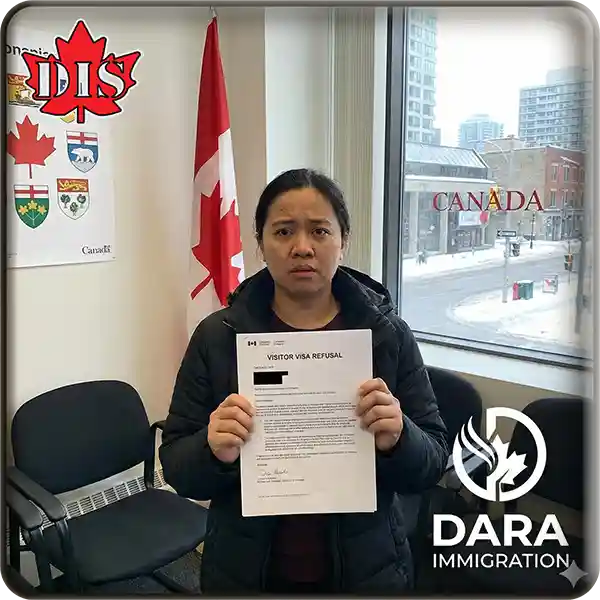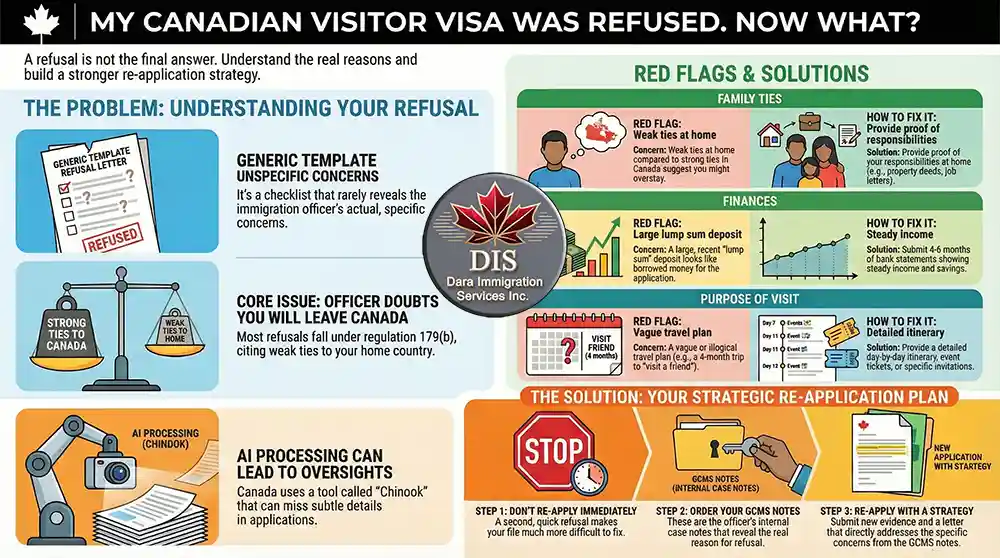Canadian Visitor Visa Refusal
Canadian Visitor Visa Refusal Overview 2026-2027
Facing a Canadian Visitor Visa Refusal can feel like an abrupt end to your travel plans, whether you were hoping to reunite with family, attend a business conference, or explore the Rockies. It is a frustrating setback, often delivered with a vague letter that leaves you wondering, “What did I do wrong?”

In 2026 Canadian Visitor Visa refusal rates for Temporary Resident Visas (TRVs) remain high as IRCC utilizes automated tools to process record volumes of applications. However, a “No” today is not necessarily a “No” forever.
At Dara Immigration Services, we look beyond the generic Canadian Visitor Visa Refusal letter. We use legal tools to uncover the officer’s actual reasoning and build a stronger, evidence-based re-application to get your travel plans back on track.
Key Takeaways (Quick Summary):
- The “Template” Trap: The refusal letter you received is a generic checklist. It rarely tells the full story.
- Section 179(b): The most common refusal reason—the officer is not satisfied you will leave Canada at the end of your stay.
- The Solution: Do not re-apply blindly. You must order your GCMS Notes to see the officer’s internal comments.
- Your Rights: You can re-apply with new evidence or, in cases of legal error, file for Judicial Review at the Federal Court.
Understanding a Canadian Visitor Visa Refusal
A Canadian Visitor Visa Refusal means that an immigration officer was not satisfied that your application met the requirements of the Immigration and Refugee Protection Act (IRPA).
The Difference Between Refusal and Return
It is important to confirm your actual status:
- Refusal: The officer processed your file and decided “No.” This is a permanent mark on your immigration record.
- Return: Your application was missing a document or fee and was sent back without processing. This is not a Canadian Visitor Visa Refusal. You can fix the error and submit again immediately.
The “Chinook” Factor (AI in Processing)
IRCC uses an Excel-based tool called Chinook to process applications in bulk. This increases speed but can lead to “generic” refusals where the officer may miss subtle details in your explanation. This makes a strong, clear submission more important than ever.
Common Reasons for a Canadian Visitor Visa Refusal
If you have been refused, it is likely due to one of these specific “red flags” identified in the immigration regulations.
1. Family Ties (Section 179(b))
The officer weighs your ties to Canada against your ties to your home country.
- The Problem: If you have strong family ties in Canada (e.g., siblings, parents) but few ties home (e.g., single, no property, freelance job), the officer may suspect you will overstay.
- The Fix: We must provide concrete proof of reasons to return (e.g., caring for aging parents, business ownership, property deeds).
2. Purpose of Visit
The reason for your trip must make sense.
- The Problem: A 4-month trip to “visit a friend” with no itinerary often looks suspicious.
- The Fix: A detailed day-by-day itinerary, hotel bookings, and specific event invitations.
3. Financial History
It is not just about how much money you have, but where it came from.
- The Problem: “Lump Sum” deposits. If $10,000 appeared in your account last week, IRCC assumes you borrowed it just for the visa.
- The Fix: 4-6 months of bank statements showing steady income accumulation, or a clear “Gift Deed” explanation.
4. Travel History
- The Problem: Having never traveled outside your home country can be a negative factor for some demographics.
- The Fix: While you cannot change the past, we can explain your travel history contextually (e.g., focusing on career building).
Costs & Timelines (2026 Estimates)
Note: Timelines for ATIP requests can vary based on IRCC workload.
| Category | Time / Cost | Notes |
| ATIP (GCMS Notes) Request | 30 – 60 Days | The critical first step. Gov fee is $5.00 CAD. |
| Re-Application Fee | $100 CAD | You must pay the government fee again. |
| Biometrics | Valid for 10 Years | Usually, you do not need to give them again. |
| Judicial Review (Federal Court) | 6 – 12 Months | Legal route if the decision was unreasonable. |
| Re-Application Processing | 14 – 45 Days | Varies by country. Often faster than the first attempt. |
Step-by-Step: Managing a Canadian Visitor Visa Refusal
Do not simply upload the same documents again. Insanity is doing the same thing and expecting a different result. Follow this forensic process.
Step 1: Stop and Breathe
Do not rage-apply immediately. A second refusal makes your file much harder to fix.
Step 2: Order GCMS Notes (ATIP)
We submit an Access to Information request to get the officer’s internal case notes.
- Why? The generic letter says “Financials.” The notes might say “Applicant’s salary of $500/month does not align with a $10,000 vacation plan.” This is the specific gap we need to close.
Step 3: Gap Analysis
Compare your original application against the officer’s concerns.
- Did you forget a document?
- Was your Letter of Invitation not notarized?
- Did they misunderstand your job title?
Step 4: Strategic Re-Submission
We draft a professional Legal Submission Letter.
- This letter quotes the officer’s concerns from the GCMS notes and directly points to the new evidence attached that resolves those concerns.
Step 5: Judicial Review (Optional)
If the notes reveal the officer made a factual error (e.g., they said you have no family in Country X, but you submitted birth certificates proving you do), we may recommend taking the case to Federal Court.
Risks and Challenges of a Canadian Visitor Visa Refusal
Understanding the gravity of a refusal helps set realistic expectations.
The “Credibility” Hit
Once refused, your credibility is damaged. Future officers will look at the previous refusal first. You are now “guilty until proven innocent.”
Misrepresentation (The 5-Year Ban)
- Warning: If you try to fix a refusal by submitting a fake document (e.g., a fake bank statement or job letter), you will be hit with a 5-year ban for Misrepresentation. Never lie to fix a refusal.
Dual Intent
You can apply for a visitor visa while a PR application (like Spousal Sponsorship) is processing. However, if you were refused, it is often because you failed to prove you would leave if the PR application failed. You must explicitly address “Dual Intent” in your next letter.
Frequently Asked Questions (FAQ)
- Is there a formal appeal process for visitor visas?
No. There is no administrative appeal for temporary resident visas. Your only options are to re-apply with new evidence or file for Judicial Review at the Federal Court if the decision was legally flawed.
- How soon can I re-apply after a refusal?
You can re-apply immediately; there is no waiting period. However, we strongly recommend waiting until you have your GCMS notes (30-60 days) to ensure you are addressing the correct problem.
- Will I get a refund for my refused application?
No. The $100 CAD application fee covers the processing of your file, not the outcome. IRCC does not refund fees for refusals.
- Do I have to declare this refusal in other countries?
Yes. If you apply for a visa to the USA, UK, Australia, etc., they will ask: “Have you ever been refused a visa for any country?” You must answer “Yes.” Sharing this data is common among the “Five Eyes” nations.
- Can a clear invitation letter guarantee approval?
No. An invitation letter (even if notarized) is just one piece of evidence. It proves why you are coming, but it does not prove why you will leave. The applicant’s own ties to their home country are more important.

Professional Immigration Assistance
A refusal is a roadblock, but it doesn’t have to be the end of your journey. Many of our successful clients started with a refusal before coming to us. The difference is the strategy.
Don’t guess at the solution. Contact Dara Immigration Services today. We will order your notes, analyze the officer’s logic, and build a “decision-ready” re-application.
Disclaimer: This article provides general information regarding Canadian Visitor Visa Refusals and does not constitute legal advice. Policies change frequently.
Download:
Download the bulletin of Canadian Visitor Visa Refusal as a PDF.
Download “Canadian-Visitor-Visa-Refusal-Bulletin-2026-2027.pdf” Canadian-Visitor-Visa-Refusal-Bulletin-2026-2027.pdf – Downloaded 30 times – 1.17 MB